Crisp, juicy and appealing, radishes are root vegetables that most people enjoy. You’ll often find them in salads and diets with lots of greens.
If you have a rabbit as a pet, you might be tempted to feed them radishes, but first, you should confirm if radishes are good for your rabbits or not.
Are Radishes Good For Your Rabbits?
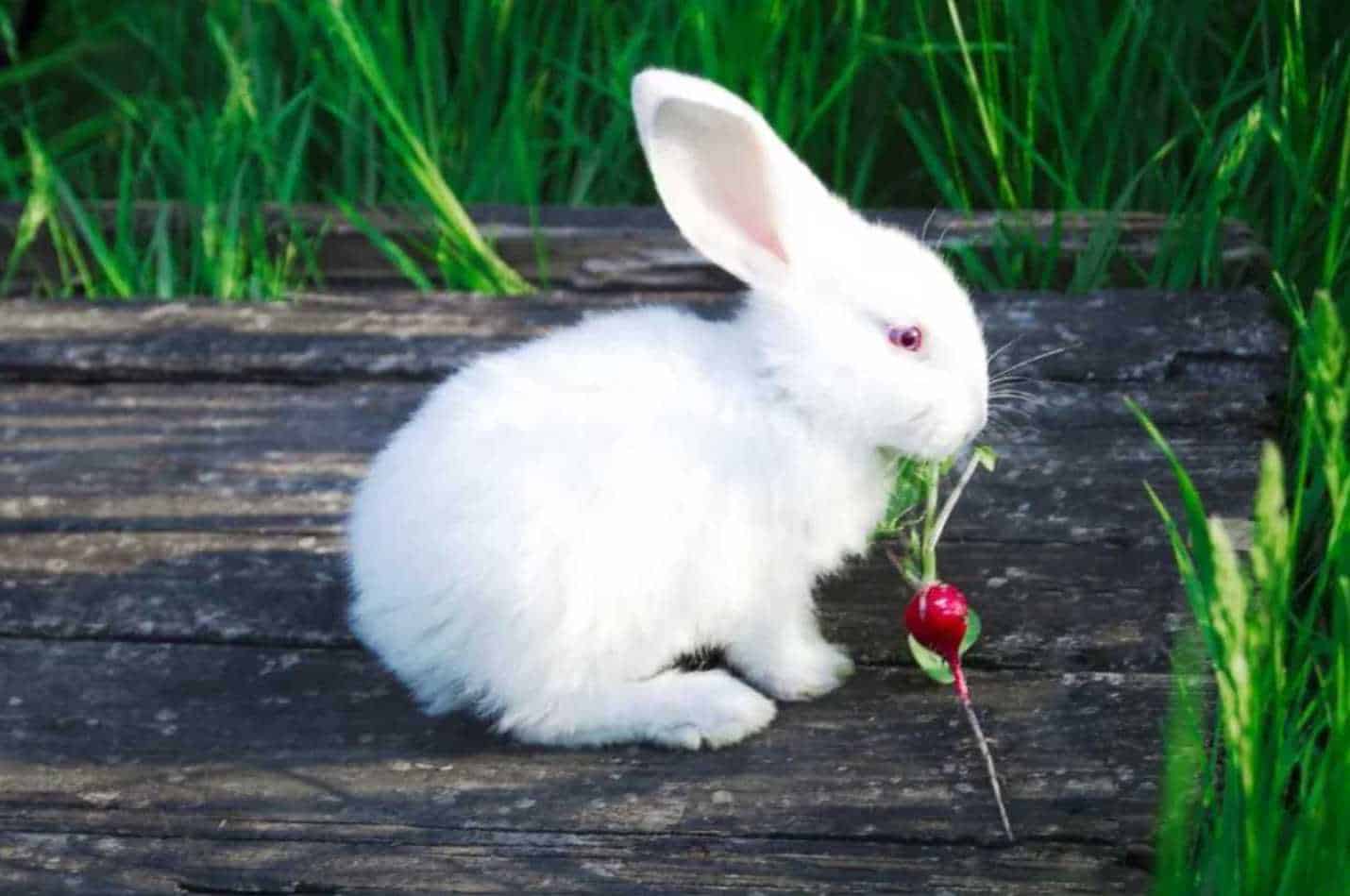
Radish, also called daikon in some Eastern countries, makes up a considerable percentage of root vegetables globally. Known scientifically as Raphanus Sativus, radishes belong to cruciferous vegetables in the brassica family and come in different sizes, tastes, and colors.
They are closely related to vegetables like broccoli, kale, mustard greens, etc. Radishes can be yellow, red, black, white, round or cylindrical, and sweet or spicy. It all depends on the variety.
There are over 20 varieties of radishes: French breakfast radish, horseradish, watermelon radish, daikon white radish, cherry belle, Zlata radish, Malaga radish, white hailstone radish, pink radish, black Spanish radish, early scarlet gold radish, crimson giant radish, easter egg radish, fire and ice radish, French dressing radish, green meat radish, perfecto radish, etc.
However, not all varieties may be suitable for your rabbit; it’s important to exercise caution and understand the specific needs of your pet.
While radishes are good for your rabbits, your rabbits shouldn’t be less than three months of age if you want to give them radishes.
Even though radishes are good, they contain gas and oxalic acid, which causes health problems for rabbits whose digestive systems aren’t mature enough or who consume them in excess quantities.
Also, you don’t need to cook radishes before you give your rabbits. Rabbits don’t do well with processed nutrients, which is something cooking does.
Can Rabbits Eat All Parts Of Radishes?
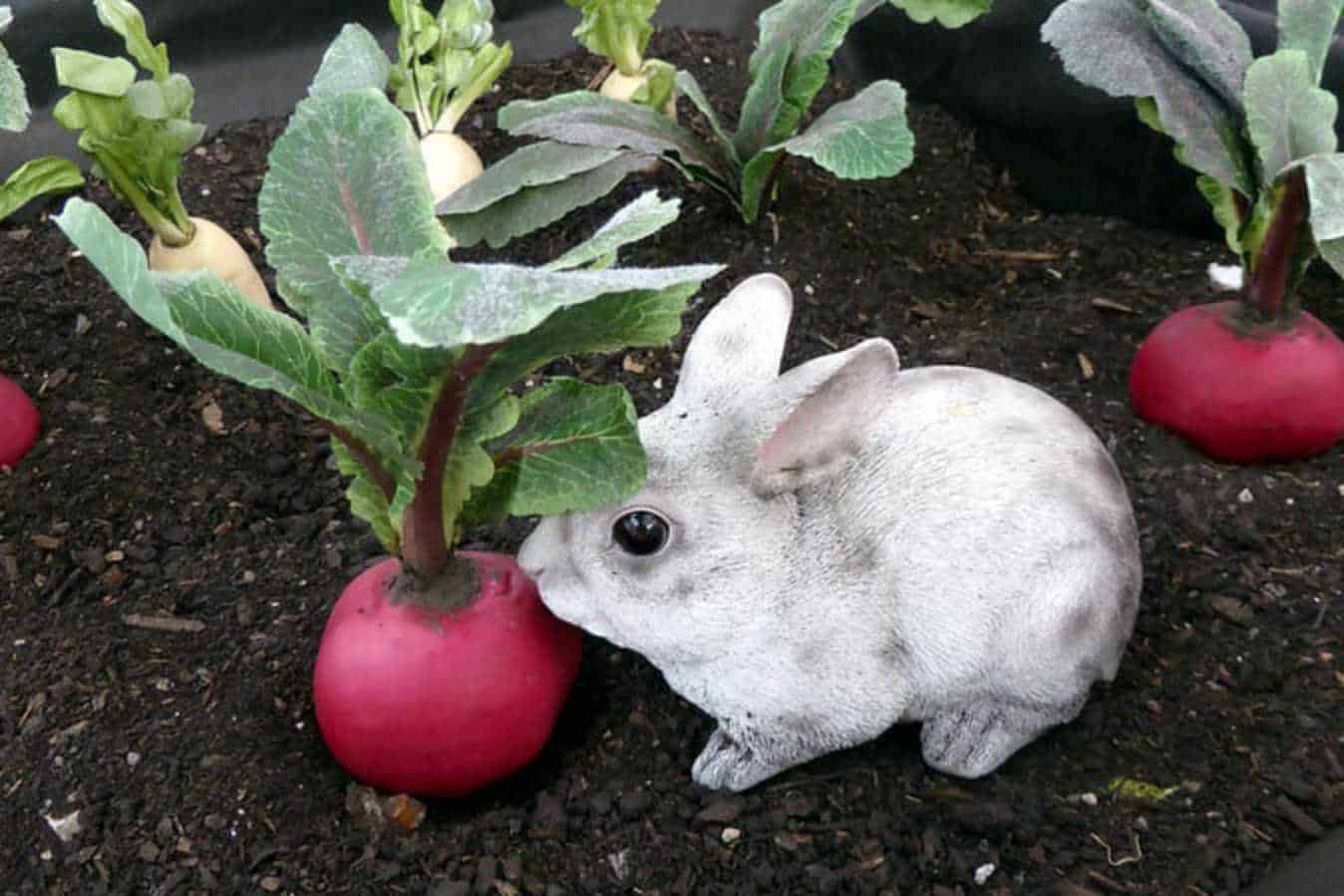
A radish has four parts: tops, also called the leaves, bulbs, seeds, and flowers. The bulb contains gas and oxalic acid, which likely cause gastrointestinal stasis in your rabbits.
As such, it shouldn’t be fed to your rabbits. However, only a thin slice should be served if your rabbits can eat them.
The leaves are safe to eat and can even be a part of the 10% greens your rabbits’ diet should contain. The seeds and flowers shouldn’t be given to your rabbits. However, they can be used for other personal purposes, such as the oil from the seeds.
However, keep in mind that rabbits have food preferences too. If your rabbits don’t like radishes, they’ll sniff the slices and turn away. Once you see this, don’t force the radish down their throats.
Also, ensure your rabbits aren’t reacting to radishes before incorporating them into their diet. For example, if their stomach bloats when you give them radish, stop feeding them radish immediately.
Are Radishes Nutritious?
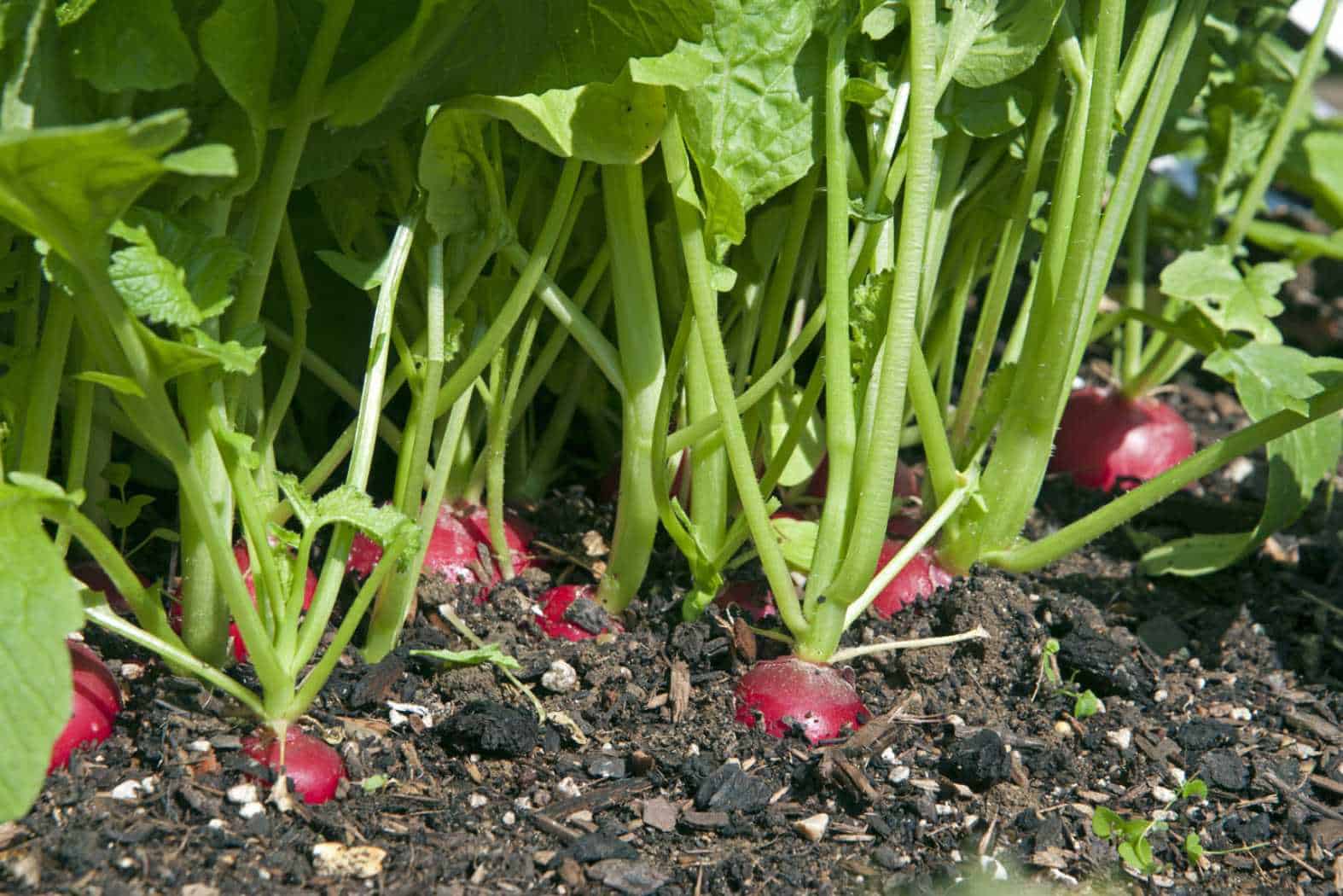
Radishes contain 5% carbohydrates and 95% water, with minor quantities of other vitamins and minerals. Below is the nutritional information of a 100g serving of radishes according to the United States Department of Agriculture:
| Nutrient | Value |
| Water [g] | 95.3 |
| Energy | 16 |
| Energy [kJ] | 66 |
| Protein [g] | 0.68 |
| Total lipid (fat) [g] | 0.1 |
| Ash [g] | 0.55 |
| Carbohydrate, by difference [g] | 3.4 |
| Fiber, total dietary [g] | 1.6 |
| Sugars, total including NLEA [g] | 1.86 |
| Sucrose [g] | 0.1 |
| Glucose (dextrose) [g] | 1.05 |
| Fructose [g] | 0.71 |
| Calcium, Ca [mg] | 25 |
| Iron, Fe [mg] | 0.34 |
| Magnesium, Mg [mg] | 10 |
| Phosphorus, P [mg] | 20 |
| Potassium, K [mg] | 233 |
| Sodium, Na [mg] | 39 |
| Zinc, Zn [mg] | 0.28 |
| Copper, Cu [mg] | 0.05 |
| Manganese, Mn [mg] | 0.07 |
| Selenium, Se [µg] | 0.6 |
| Fluoride, F [µg] | 6 |
| Vitamin C, total ascorbic acid [mg] | 14.8 |
| Thiamin [mg] | 0.01 |
| Riboflavin [mg] | 0.04 |
| Niacin [mg] | 0.25 |
| Pantothenic acid [mg] | 0.17 |
| Vitamin B-6 [mg] | 0.07 |
| Folate, total [µg] | 25 |
| Folate, food [µg] | 25 |
| Folate, DFE [µg] | 25 |
| Choline, total [mg] | 6.5 |
| Betaine [mg] | 0.1 |
| Carotene, beta [µg] | 4 |
| Vitamin A, IU [IU] | 7 |
| Lutein + zeaxanthin [µg] | 10 |
| Tocotrienol, alpha [mg] | 0.02 |
| Vitamin K (phylloquinone) [µg] | 1.3 |
| Fatty acids, total saturated [g] | 0.03 |
| 16:0 [g] | 0.03 |
| 18:0 [g] | 0 |
| Fatty acids, total monounsaturated [g] | 0.02 |
| 18:1 [g] | 0.02 |
| Fatty acids, total polyunsaturated [g] | 0.05 |
| 18:2 [g] | 0.02 |
| 18:3 [g] | 0.03 |
| Phytosterols [mg] | 7 |
| Tryptophan [g] | 0.01 |
| Threonine [g] | 0.02 |
| Isoleucine [g] | 0.02 |
| Leucine [g] | 0.03 |
| Lysine [g] | 0.03 |
| Methionine [g] | 0.01 |
| Cystine [g] | 0.01 |
| Phenylalanine [g] | 0.04 |
| Tyrosine [g] | 0.01 |
| Valine [g] | 0.04 |
| Arginine [g] | 0.04 |
| Histidine [g] | 0.01 |
| Alanine [g] | 0.03 |
| Aspartic acid [g] | 0.06 |
| Glutamic acid [g] | 0.16 |
| Glycine [g] | 0.03 |
| Proline [g] | 0.02 |
| Serine [g] | 0.03 |
- Fights cancer, inflammation, etc: Radishes contain compounds that help ward off cancer. Most of these compounds, such as isothiocyanates, are in the roots, so you can feed your rabbits radish roots. However, you’ve to be careful with the quantities as the roots also contain gas.
- Helps with digestion: Radishes contain fiber which helps fight constipation and other intestinal problems. It also reduces high blood sugar and cholesterol levels and gastric ulcer risks.
- Improves cardiovascular health: Another benefit of radishes is that they improve heart health. Rabbits are prone to heart issues due to their fragility. Radishes contain flavonoids which decrease the risks of cardiovascular diseases.
- Provides hydration: Your rabbits won’t get dehydrated if you include radishes in their diet, containing over 90% water.
5 Tips For Feeding Your Rabbits Radishes
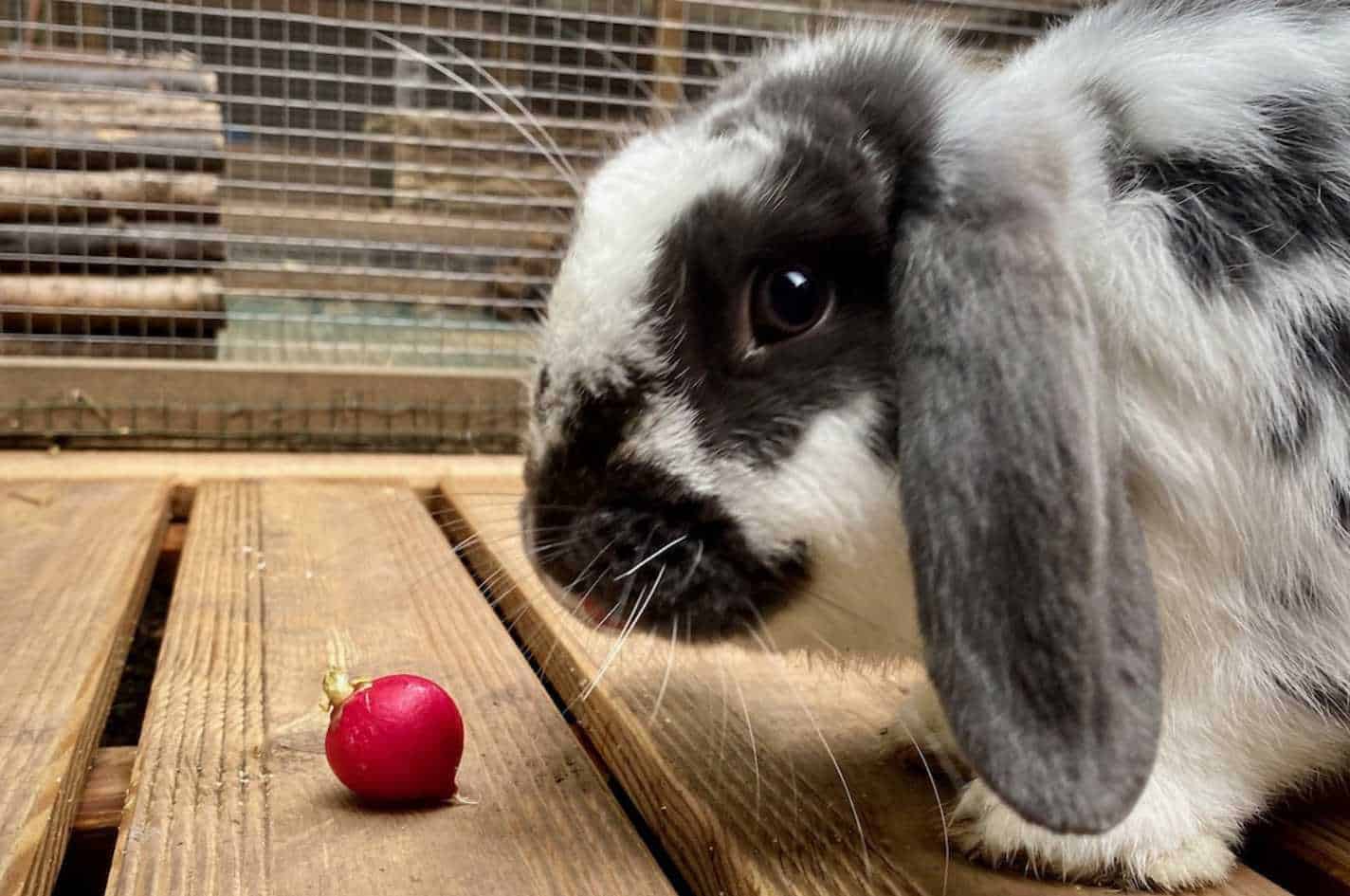
Here are some things to note when feeding your rabbits radishes:
- Quantity: Rabbit’s diet should be 85% hay, 5% pellets, and 10% greens. In light of this, radishes serve as a part of the greens; you can mix radish tops with other vegetables for your rabbits. They should not account for the main portion of your rabbits’ food. Too many radishes cause gastrointestinal stasis and obesity for your rabbits. A thin slice once a day for about 2 to 3 times per week is enough. A whole radish is too much for one rabbit. In addition, ensure the slices aren’t too big for your rabbits to carry in their mouths.
- Age of rabbits: Never feed radishes to rabbits for less than three months. Baby rabbits have a more delicate digestive system that can’t process the gas and acid in radishes. Even though radish roots contain most nutrients, exercise caution when feeding your rabbits as they contain gas.
- Food preferences: It’s possible your rabbits won’t like radishes even though they are good. Don’t force them to. Only give your rabbits the food they want to eat.
- Changes in stool/body: Stop giving them radishes once you notice any change in your rabbits’ stool or their bodies, such as a bloated stomach or if you’ve to force them to eat radishes. It means that they’re sensitive to the vegetable.
- Pest-free radishes: The radishes you feed your rabbits must be free from pests and parasites. If they are infested, your rabbits could get poisoned or become ill if they eat infested radishes. Only buy organically-grown radishes or grow them yourself.
Picking Healthy Radishes For Your Rabbits
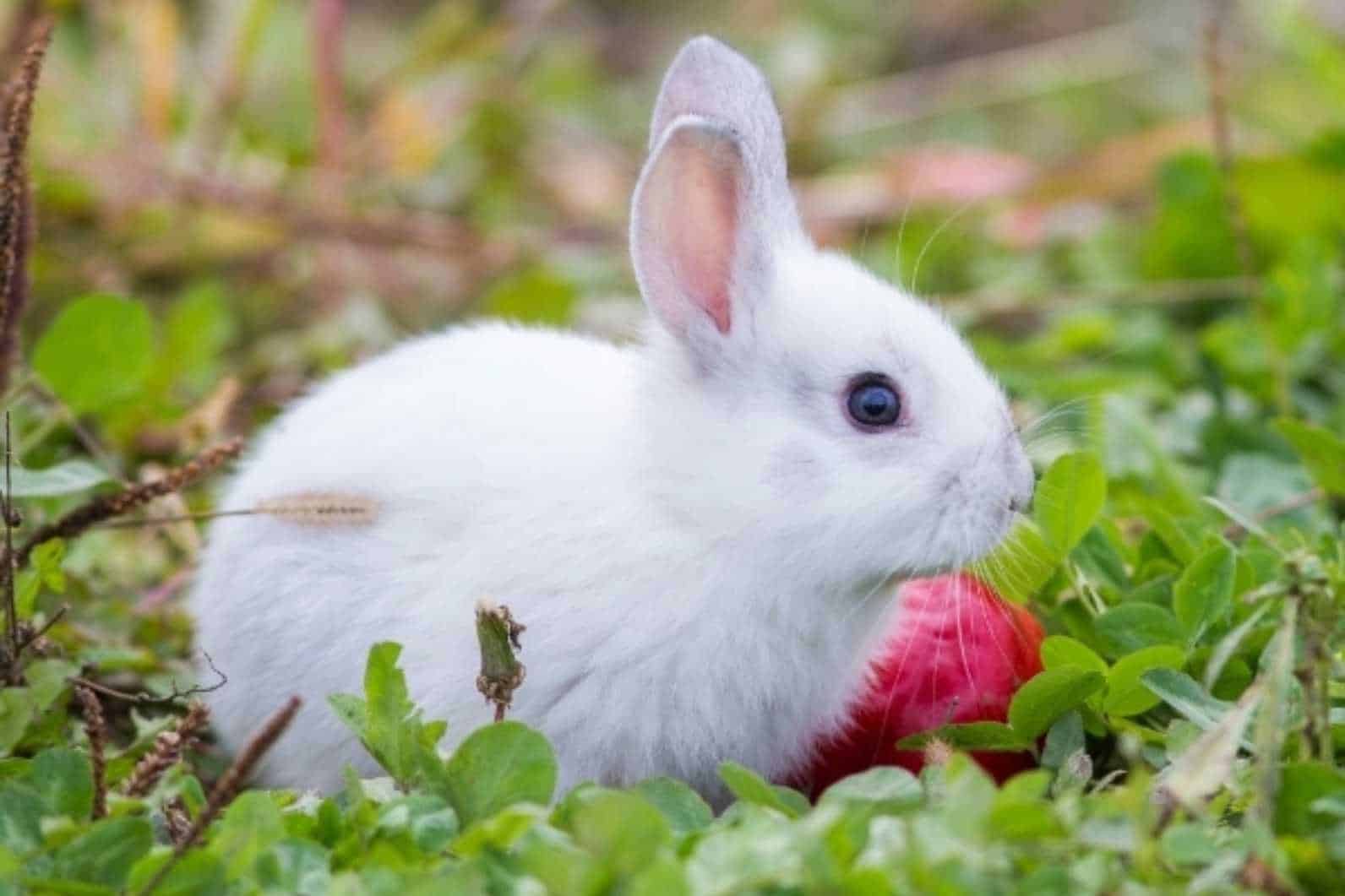
If you give your rabbits rotten or diseased radishes, they’ll likely get diarrhea, and you’ll have to deal with the burden of treating them. But you can avoid this.
Here’s how:
- Radishes are usually spicy or peppery with a subtle smell. If they smell rotten or have an off smell, then they aren’t healthy. The smell shouldn’t be something you turn your nose at.
- Check the radish for all-round firmness. A good radish won’t be soggy or soft; its skin is firm to the touch. It also won’t be wilted or dry. There should be no signs of decay, and the color shouldn’t change. Except the radish’s color is naturally black, any radish that turns black is rotting.
- Radish tops are always green and fresh. If they are wilted, the radish isn’t edible.
2 Ways To Preserve Radishes For Your Rabbits
If you buy radishes in bulk for your rabbits, you should know how to preserve them. Usually, radishes don’t last beyond one to three days at room temperature.
The greens last for about 1-2 days. However, you can preserve them for longer by refrigerating, freezing, or sandboxing them. Inside the freezer, radishes can last for two weeks, while the greens for three days.
Black radishes can stay for over a month without getting spoilt. If you’re sandboxing, radish bulbs can last up to 2 months.
- If you’re freezing your radishes, cut off the tops. You’re to store the tops separately from the bulbs. You don’t need to wash the radishes, but ensure you dry them thoroughly if you do. Water aids decay faster in the freezer. Place both the tops and bulbs in separate airtight plastic bags or containers.
- If you’re sandboxing, ensure both the sand and radish bulbs are dry. Put some dry sand in an open box and place the bulbs on it. You can’t sandbox the leaves as they’ll get rotten.
Summary
While radishes are tasty root vegetables, they don’t contain the nutrients your rabbits need in adequate quantities. Therefore, you shouldn’t overwhelm your rabbits with them.
Stick with the recommended food. If your rabbits don’t like radishes, don’t force them to. There are other numerous vegetables you can give them. Your rabbit’s wellbeing should be your utmost priority.